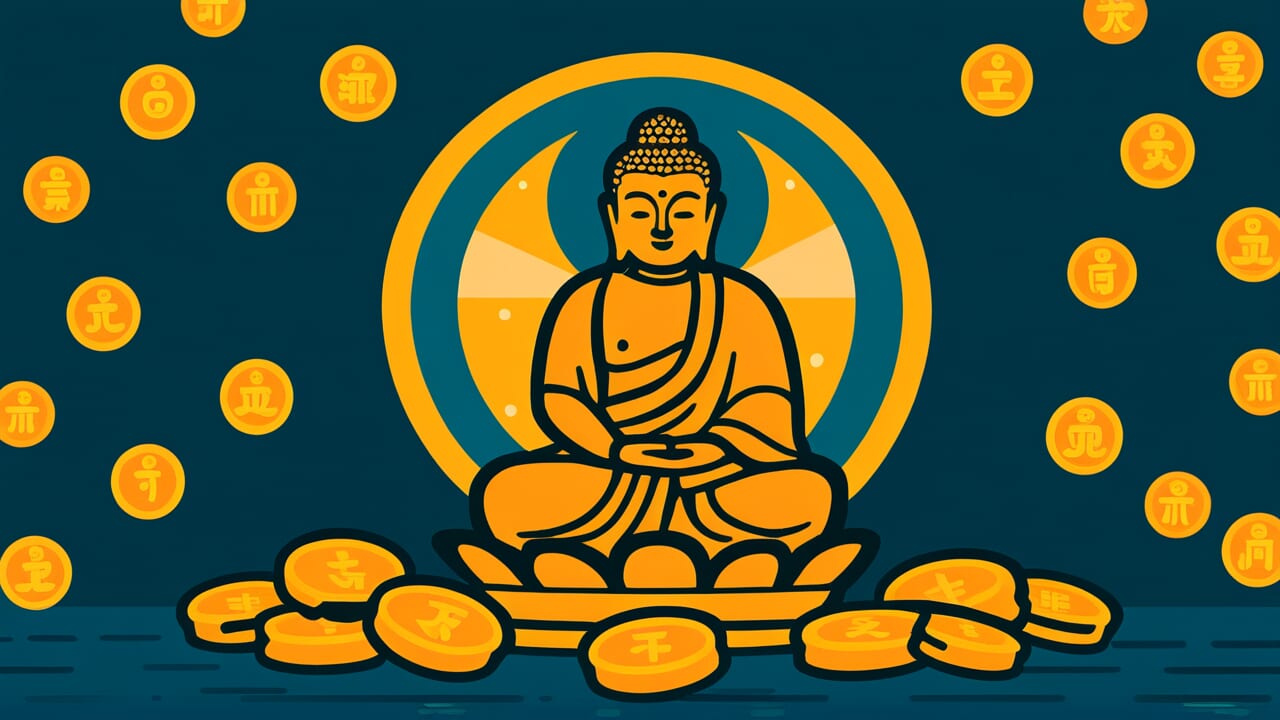How to Read “Even Buddha shines with money”
あみだもぜにでひかる
Meaning of “Even Buddha shines with money”
This proverb means that even noble beings like gods and Buddha cannot escape the power of money.
It points out the ironic reality that money influences even the world of faith and spirituality, where such material concerns should not matter.
People use this saying when they see someone or an organization that should be pure getting swayed by money.
It also applies when facing the gap between ideals and reality. For example, when a respected teacher turns out to act based on money after all.
The expression captures society’s reality with a calm, sometimes cynical tone.
Even today, this proverb remains convincing. No matter how noble the ideals an organization or person claims, they often must compromise before the power of money.
This saying accurately captures that unchanging truth.
Origin and Etymology
The exact first appearance of this proverb in literature is unclear. However, the structure of the phrase reveals an interesting background.
“Amida” refers to Amida Buddha, a central figure in Japanese Buddhist faith. Amida Buddha statues in temples are covered with gold leaf and shine magnificently.
This shine is considered the core of the proverb. While people might think Buddha statues shine because of faith or Buddha’s mercy, the ironic truth is they shine because of gold leaf.
In other words, they shine because of “zeni” – money.
During the Edo period, temple repairs and reapplying gold leaf to Buddha statues required large sums of money.
Without donations from temple supporters, statues would age and lose their shine. But when wealthy merchants made large donations, statues were beautifully restored and shone golden.
Common people who witnessed this reality likely created this expression. It carries both irony and resignation about how “even gods and Buddha ultimately shine through the power of money.”
The saying spread as a sharp observation about society’s reality. It shows that money’s power reaches even into the world of faith.
Usage Examples
- That charity organization apparently can’t go against major donors’ wishes – truly “Even Buddha shines with money”
- Seeing a religious leader who preaches simple living drive a luxury car, I thought this is exactly what “Even Buddha shines with money” means
Universal Wisdom
“Even Buddha shines with money” has been passed down through generations because it perfectly captures the eternal contradiction between ideals and reality in human society.
We all wish there were sacred spaces where money’s power doesn’t reach. We want to believe that noble values like faith, justice, love, and truth exist in a world separate from money.
However, reality shows that even places with the noblest ideals need funding for maintenance and operation.
Temple repairs require donations. Charity work needs funding. Even realizing justice requires an economic foundation.
When people notice this contradiction, they might feel disillusioned. But our ancestors had the wisdom to accept this reality calmly rather than lament it.
This proverb contains the importance of understanding real-world dynamics while pursuing ideals.
Acknowledging money’s power doesn’t mean abandoning ideals. Rather, it shows a mature understanding that facing reality allows us to achieve more effective good.
This represents the wisdom of adults who can embrace both purity and pragmatism.
When AI Hears This
Gold leaf on Buddha statues inevitably peels if left alone. This follows the second law of thermodynamics showing “entropy increase.”
It’s a universal rule that ordered things naturally move toward disorder. The highly organized state of gold leaf will certainly break down through oxidation and wear.
Maintenance requires human effort and funding.
What’s interesting is this law applies not just to matter but also to the concept of “sacredness.”
A temple’s dignity and a Buddha statue’s shine cannot be maintained without constant energy input through building repairs, cleaning, and continuing ceremonies.
For example, Kyoto’s Kinkaku-ji was rebuilt after burning down in 1950 at enormous cost. In 1987, reapplying gold leaf cost about 740 million yen.
Without this investment, today’s shine wouldn’t exist.
In other words, even “sacred things” are under physical laws and will deteriorate if neglected. No matter how spiritually elevated something is, if it appears as matter, it cannot escape entropy increase.
This proverb insightfully recognizes that abstract values like ideals and faith require continuous resource investment in the real world.
Even gods and Buddha cannot shine without maintenance costs.
Lessons for Today
This proverb teaches us the importance of balancing idealism and realism. Having noble principles and beautiful ideals is wonderful.
But we shouldn’t neglect the practical means to realize them.
For example, when engaging in social contribution activities, pure goodwill alone cannot create sustainable work.
We need to pay attention to practical aspects like financial planning, organizational management, and public relations.
Rather than thinking “talking about money taints ideals,” we should view it as “securing resources is necessary precisely to realize ideals.”
This proverb also teaches the importance of developing a multifaceted view of things. Understanding the real mechanisms behind surface beauty and respectability helps us make more mature judgments.
Having ideals while facing reality – this flexible strength may be the wisdom needed to navigate modern society.



Comments